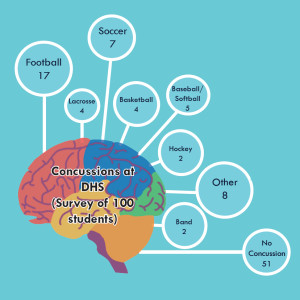A hard-hitting fact: Increased awareness of concussions has caused controversy, forcing sports to adapt
By Conor Van Dusen & Caden Koenig
When thinking about the recent Michigan vs. Michigan State game, it’s likely the first thing that comes to mind is the spectacular and unexpected finish that left some devastated, others satisfied, and everyone surprised. However, the game winning “punt-six” wasn’t the only controversy surrounding the widely watched rivalry game.
The concussion controversy took center stage in the first half when Michigan senior linebacker Joe Bolden was ejected for falling head first onto Michigan State quarterback Connor Cook. Bolden was ejected from the game for targeting, a rule implemented in 2008 designed to discourage players from initiating helmet-to-helmet contact.
Since, the officials decision has been widely criticized as an example of concussion prevention taken too far. Whether you agree with the call to eject Bolden, it’s hard to deny that it has raised many questions about how we deal with concussions in athletics.
The risk of concussions in sports and how they affect players is hardly a new controversy. People have long been concerned with how athletes are affected by head injuries such as concussions. However, it wasn’t until around the turn of the century that the dangers of concussions began to be fully and universally understood.
Beginning around 2003, studies published in the US National Library of Medicine began to link concussions with chronic depression, Alzheimer’s, and other severe mental ailments. As a result, sports at all levels slowly started to implement rules and regulations designed to decrease the frequency of concussions, as well as more accurately diagnose and effectively treat them. Although considered by many as necessary, the relatively new emphasis on concussion prevention and treatment in sports has not been without criticism.
The threat of concussions, and rule changes designed to prevent and treat them, are not something that only professional athletes have to deal with. What started as an issue in professional athletics has trickled down to affect virtually every level of competitive sports, including high school athletics at Dexter.
As a result, the issue of concussions is one that Dexter Athletic Director Mike Bavineau is very familiar with. Bavineau states that although some have become slightly paranoid regarding concussions, caution is warranted.

“I think concussions have become a really big catch word,” Bavineau said. “People are more quick to assume somebody may have a concussion. I don’t think you can ever say concussions aren’t very dangerous. I mean, it’s your brain. . . So, I don’t think it’s too much, to where people are too hypersensitive about it.
DHS Football Head Coach views the issue in a similar way.
“I think at this point the rules have been changed properly,” he said. “But the pendulum of the reaction has swung so far to one way to where now any tap on the head is suspect to ejection. I think the expectation of how they’re enforced is a little bit off.”
DHS junior and varsity football player Adam Burton, who received two concussions in the 2015 season alone, claims concussions have already noticeably impacted his day to day life.
“I have trouble concentrating, I have headaches, and I have difficulties in school and with my homework,” Burton said.
Despite this, Burton is against further reform, saying in order to play football “you have to be tough.”
Burton is not alone in this opinion, as may think that the integrity of some sports has been compromised by rule changes that aim to decrease the frequency of concussions. Critics argue that rule changes are unnecessary as long as athletes are well educated on the dangers of concussions, for participation in athletics is voluntary and those who participate do so at their own risk.
In spite of efforts to make sports safer, as more information is gathered on the dangers of concussions in athletics, an increasing number of protective parents are steering their children away from competitive sports. Heavy-contact sports such as football and hockey have suffered the most from this relatively new trend.
Dexter athletic trainer Trevor O’Brien, who deals regularly with athletic concussions as part of his job, believes that concussions alone are not a good reason to keep a child out of contact sports.
“I wouldn’t hold my kid out of a contact sport because of the risk of a concussion,” O’Brien said. “You can get a concussion in a car crash or from slipping on ice while walking on the sidewalk. There’s a risk with everything in life.”
Koenig, who also deals regularly with athletic induced concussions, believes that the benefits of competitive sports outweigh the risk.
“I think taking that risk is worth the lessons that you learn from sports,” Koenig said. “The leadership you gain in a team sport by working with a group of people, or in an individual sport, carries over into every aspect of your life, even as you go onto graduate and go into the workplace.”
Despite increasing concern over the negative long term effects of concussions, participation in high school athletics at Dexter has remained steady.
“We haven’t seen a large amount of change in the number of people participating in sports, or in ‘concussion sports,’” Bavineau said. “People are more aware of concussions, but I don’t think participation been affected because of it. We’ve stayed pretty close to the same numbers in the past few years.”
Although they have already severely impacted the way we participate in certain sports, much is still unknown about the longterm effects of concussions on mental health.
A recent study, conducted in 2014 by Dr. Ann McKee of Boston University, found that out of 79 former NFL players studied, 76 tested positive for chronic traumatic encephalopathy, a rare brain condition caused by repeated head trauma that negatively affects mood, cognition, behavior, and motor skills. As more information develops, concussions are likely to continue influencing how sports are officiated, coached, and played.
“I think you have to be cautious until we can learn more about how concussions really affect people, not just when you’re young but when you’re older,” Bavineau said. “In a few years I think we’re gonna learn a lot more, now that we have some baseline data.”
Note: A sidebar on “Concussion” the movie accompanied this centerspread story.

